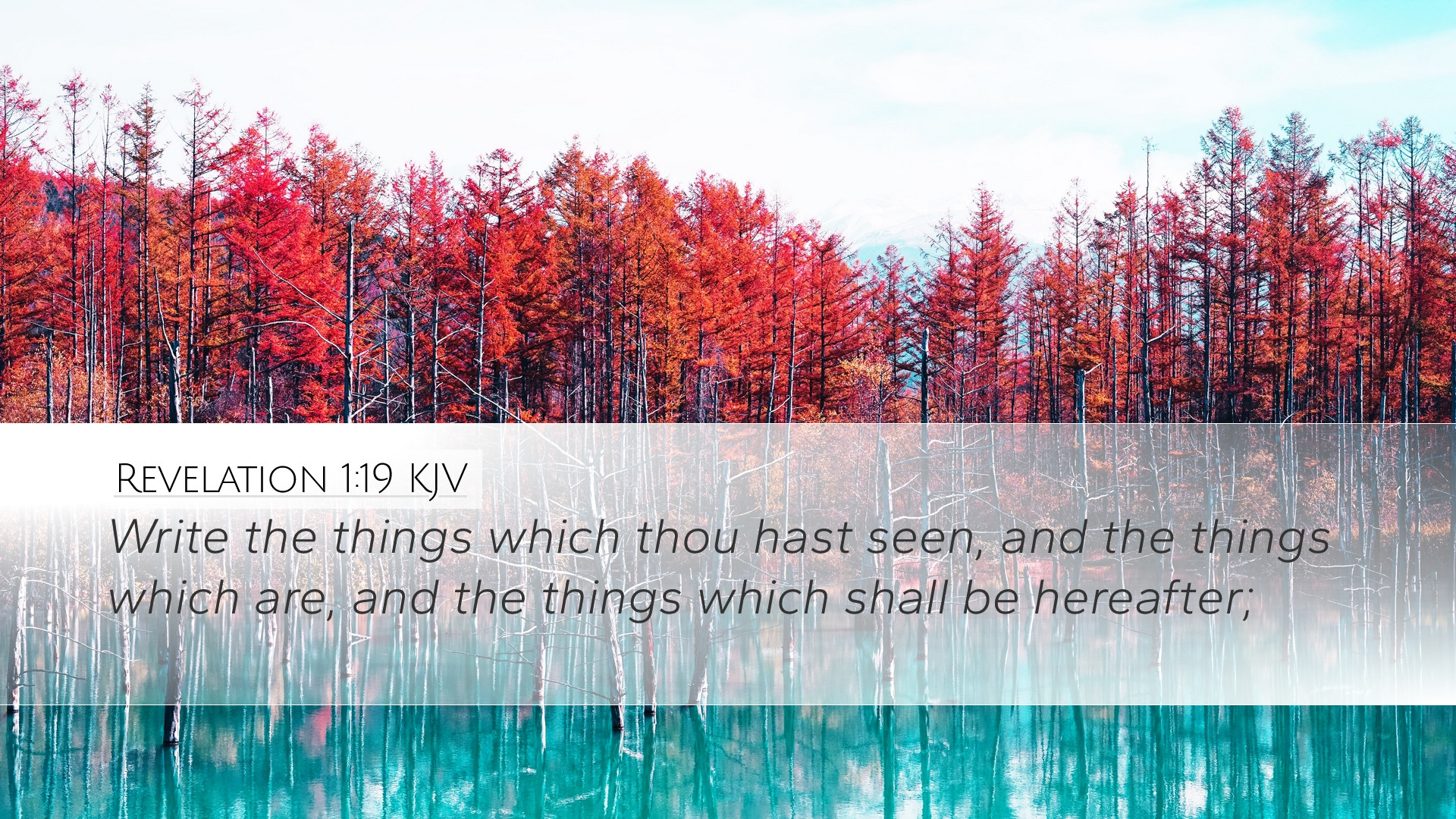Commentary on Revelation 1:19
The verse Revelation 1:19 states:
"Write the things which thou hast seen, and the things which are, and the things which shall be hereafter."
This verse is a significant introduction to the entire book of Revelation, encompassing its structure and intended message. Various public domain commentaries offer insights that provide depth to this text.
Matthew Henry's Commentary
Matthew Henry emphasizes that the instruction to "write" not only identifies John as the author but also highlights the sacred nature of the revelations he is to record. The verse mandates a tripartite division of the contents:
- The things which thou hast seen: This refers to the vision of Christ in His glory presented to John in the opening chapter.
- And the things which are: This section pertains to the current state of the seven churches in Asia, which reflects the condition of the church throughout history.
- And the things which shall be hereafter: This points to the events that will transpire in the future, detailing God's ultimate plan and judgment.
Henry elaborates that this division serves to provide a complete overview of the message of Revelation and conveys the continuity of God's dealings with humanity across different eras.
Albert Barnes' Notes
Albert Barnes remarks that this verse succinctly outlines the structure of Revelation. He asserts that John is instructed to document not merely spiritual experiences but concrete truths that serve as a chronicle of God's revelations. Barnes points out the following:
- Clarity in Instruction: The command reflects the necessity for clarity and order in communicating divine visions. Each segment serves a purpose in the theological narrative of God's redemptive work.
- Prophetic Importance: The prophetic nature of the revelations signifies the seriousness with which God expects His truths to be conveyed and preserved for future generations.
- Timeless Relevance: The implications of John’s writings maintain relevance beyond his time, as they speak to the church in all ages, addressing both current challenges and future hopes.
Barnes concludes that the book of Revelation stands as a powerful reminder of God's sovereignty and the fulfillment of His promises throughout history.
Adam Clarke's Commentary
Adam Clarke offers a theological insight into the verse by emphasizing the divine nature of the message John is to convey. He highlights:
- The Revelation's Authority: Clarke notes that this divine directive underscores the authority behind the writing. John is not merely sharing experiences; he is recording authoritative truths ordained by God.
- Sequential Nature of Revelation: The stated sequences ("what thou hast seen," "what is," "what shall be hereafter") indicate a progression in God's redemptive history. This points to the unfolding nature of God's salvation plan over time.
- Role of the Church: Clarke discusses how the message to the churches serves as both a spiritual warning and encouragement, showcasing the relevance of God's word in the life of each believer and congregation.
He emphasizes that understanding this verse is crucial for a proper interpretation of the entire Revelation, as it lays the groundwork for its prophetic context.
Theological Reflections
The insights from these commentaries reveal multiple dimensions of this passage that encompass theological, historical, and eschatological aspects. Pastors, students, theologians, and scholars are invited to reflect on the following themes:
- The Inspiration of Scripture: The call for John to write emphasizes the believed inerrancy and infallibility of God's revelation.
- Church History and Prophecy: Understanding the messages to the churches is vital for grasping the implications of prophecy and instruction for today's church.
- The Continuity of God's Plan: Revelation serves as a reminder of the unfolding narrative of God's plan for humanity from inception to consummation.
Conclusion
Revelation 1:19 serves as a foundational verse that encapsulates the essence of the entire book, giving structure to the vision given to John. The commentaries of Matthew Henry, Albert Barnes, and Adam Clarke collectively highlight the importance of viewing Revelation not only as a prophetic book but as a vital theological resource that speaks to the past, present, and future of God's people.
As we delve into this text, may we be encouraged to engage with the living Word of God, discerning His messages for our lives and for the church as we navigate our own faith journeys.


